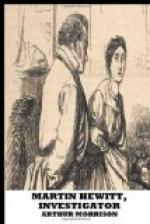“Precisely. I can’t know too much in a case like this. It can do no harm if I know all about fifty innocent people, and may save me from the risk of knowing nothing about the thief. Now, let me see: Mr. Wollett’s rooms, you say, are near Mr. Claridge’s place of business? Is there any means of communication between the roofs?”
“Yes, I am told that it is perfectly possible to get from one place to the other by walking along the leads.”
“Very good! Then, unless you can think of any other information that may help me, I think, Lord Stanway, I will go at once and look at the place.”
“Do, by all means. I think I’ll come back with you. Somehow, I don’t like to feel idle in the matter, though I suppose I can’t do much. As to more information, I don’t think there is any.”
“In regard to Mr. Claridge’s assistant, now: Do you know anything of him?”
“Only that he has always seemed a very civil and decent sort of man. Honest, I should say, or Claridge wouldn’t have kept him so many years—there are a good many valuable things about at Claridge’s. Besides, the man has keys of the place himself, and, even if he were a thief, he wouldn’t need to go breaking in through the roof.”
“So that,” said Hewitt, “we have, directly connected with this cameo, besides yourself, these people: Mr. Claridge, the dealer; Mr. Cutler, the assistant in Mr. Claridge’s business; Hahn, who sold the article to Claridge, and Mr. Woollett, who made bids for it. These are all?”
“All that I know of. Other gentlemen made bids, I believe, but I don’t know them.”
“Take these people in their order. Mr. Claridge is out of the question, as a dealer with a reputation to keep up would be, even if he hadn’t immediately sent you this five thousand pounds—more than the market value, I understand, of the cameo. The assistant is a reputable man, against whom nothing is known, who would never need to break in, and who must understand his business well enough to know that he could never attempt to sell the missing stone without instant detection. Hahn is a man of shady antecedents, probably clever enough to know as well as anybody how to dispose of such plunder—if it be possible to dispose of it at all; also, Hahn hasn’t been to Claridge’s to-day, although he had an appointment to take money. Lastly, Mr. Woollett is a gentleman of the most honorable record, but a perfectly rabid collector, who had made every effort to secure the cameo before you bought it; who, moreover, could have seen Mr. Claridge working in his back room, and who has perfectly easy access to Mr. Claridge’s roof. If we find it can’t be none of these, then we must look where circumstances indicate.”
There was unwonted excitement at Mr. Claridge’s place when Hewitt and his client arrived. It was a dull old building, and in the windows there was never more show than an odd blue china vase or two, or, mayhap, a few old silver shoe-buckles and a curious small sword. Nine men out of ten would have passed it without a glance; but the tenth at least would probably know it for a place famous through the world for the number and value of the old and curious objects of art that had passed through it.




